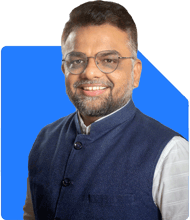Need Expert Advice?Our Gurus Can Help
Ramalingam Kalirajan |1931 Answers |Ask -Follow
Mutual Funds, Financial Planning Expert - Answered on May 11, 2024
Ramalingam Kalirajan |1931 Answers |Ask -Follow
Mutual Funds, Financial Planning Expert - Answered on May 11, 2024
Ramalingam Kalirajan |1931 Answers |Ask -Follow
Mutual Funds, Financial Planning Expert - Answered on May 11, 2024
Ramalingam Kalirajan |1931 Answers |Ask -Follow
Mutual Funds, Financial Planning Expert - Answered on May 11, 2024
Ramalingam Kalirajan |1931 Answers |Ask -Follow
Mutual Funds, Financial Planning Expert - Answered on May 11, 2024
Ramalingam Kalirajan |1931 Answers |Ask -Follow
Mutual Funds, Financial Planning Expert - Answered on May 11, 2024
Ramalingam Kalirajan |1931 Answers |Ask -Follow
Mutual Funds, Financial Planning Expert - Answered on May 11, 2024
Ramalingam Kalirajan |1931 Answers |Ask -Follow
Mutual Funds, Financial Planning Expert - Answered on May 11, 2024
Ramalingam Kalirajan |1931 Answers |Ask -Follow
Mutual Funds, Financial Planning Expert - Answered on May 11, 2024
Ramalingam Kalirajan |1931 Answers |Ask -Follow
Mutual Funds, Financial Planning Expert - Answered on May 11, 2024
Ramalingam Kalirajan |1931 Answers |Ask -Follow
Mutual Funds, Financial Planning Expert - Answered on May 11, 2024
Ramalingam Kalirajan |1931 Answers |Ask -Follow
Mutual Funds, Financial Planning Expert - Answered on May 11, 2024
Ramalingam Kalirajan |1931 Answers |Ask -Follow
Mutual Funds, Financial Planning Expert - Answered on May 11, 2024
Ramalingam Kalirajan |1931 Answers |Ask -Follow
Mutual Funds, Financial Planning Expert - Answered on May 11, 2024
Ramalingam Kalirajan |1931 Answers |Ask -Follow
Mutual Funds, Financial Planning Expert - Answered on May 11, 2024
Ramalingam Kalirajan |1931 Answers |Ask -Follow
Mutual Funds, Financial Planning Expert - Answered on May 11, 2024
Ramalingam Kalirajan |1931 Answers |Ask -Follow
Mutual Funds, Financial Planning Expert - Answered on May 11, 2024
Ramalingam Kalirajan |1931 Answers |Ask -Follow
Mutual Funds, Financial Planning Expert - Answered on May 11, 2024
Ramalingam Kalirajan |1931 Answers |Ask -Follow
Mutual Funds, Financial Planning Expert - Answered on May 11, 2024
Ramalingam Kalirajan |1931 Answers |Ask -Follow
Mutual Funds, Financial Planning Expert - Answered on May 11, 2024
Ramalingam Kalirajan |1931 Answers |Ask -Follow
Mutual Funds, Financial Planning Expert - Answered on May 11, 2024
Ramalingam Kalirajan |1931 Answers |Ask -Follow
Mutual Funds, Financial Planning Expert - Answered on May 11, 2024
Ramalingam Kalirajan |1931 Answers |Ask -Follow
Mutual Funds, Financial Planning Expert - Answered on May 11, 2024
Ramalingam Kalirajan |1931 Answers |Ask -Follow
Mutual Funds, Financial Planning Expert - Answered on May 11, 2024
Ramalingam Kalirajan |1931 Answers |Ask -Follow
Mutual Funds, Financial Planning Expert - Answered on May 11, 2024
Ramalingam Kalirajan |1931 Answers |Ask -Follow
Mutual Funds, Financial Planning Expert - Answered on May 11, 2024
Ramalingam Kalirajan |1931 Answers |Ask -Follow
Mutual Funds, Financial Planning Expert - Answered on May 11, 2024
Ramalingam Kalirajan |1931 Answers |Ask -Follow
Mutual Funds, Financial Planning Expert - Answered on May 11, 2024
Ramalingam Kalirajan |1931 Answers |Ask -Follow
Mutual Funds, Financial Planning Expert - Answered on May 11, 2024
Ramalingam Kalirajan |1931 Answers |Ask -Follow
Mutual Funds, Financial Planning Expert - Answered on May 11, 2024
Ramalingam Kalirajan |1931 Answers |Ask -Follow
Mutual Funds, Financial Planning Expert - Answered on May 11, 2024
Ramalingam Kalirajan |1931 Answers |Ask -Follow
Mutual Funds, Financial Planning Expert - Answered on May 11, 2024
Ramalingam Kalirajan |1931 Answers |Ask -Follow
Mutual Funds, Financial Planning Expert - Answered on May 11, 2024
Ramalingam Kalirajan |1931 Answers |Ask -Follow
Mutual Funds, Financial Planning Expert - Answered on May 11, 2024
Ramalingam Kalirajan |1931 Answers |Ask -Follow
Mutual Funds, Financial Planning Expert - Answered on May 11, 2024
Mihir Tanna |831 Answers |Ask -Follow
Tax Expert - Answered on May 10, 2024
Mihir Tanna |831 Answers |Ask -Follow
Tax Expert - Answered on May 10, 2024
Mihir Tanna |831 Answers |Ask -Follow
Tax Expert - Answered on May 10, 2024
Mihir Tanna |831 Answers |Ask -Follow
Tax Expert - Answered on May 10, 2024
Mihir Tanna |831 Answers |Ask -Follow
Tax Expert - Answered on May 10, 2024
Mihir Tanna |831 Answers |Ask -Follow
Tax Expert - Answered on May 10, 2024
Ramalingam Kalirajan |1931 Answers |Ask -Follow
Mutual Funds, Financial Planning Expert - Answered on May 10, 2024
Ramalingam Kalirajan |1931 Answers |Ask -Follow
Mutual Funds, Financial Planning Expert - Answered on May 10, 2024
Ramalingam Kalirajan |1931 Answers |Ask -Follow
Mutual Funds, Financial Planning Expert - Answered on May 10, 2024
Ramalingam Kalirajan |1931 Answers |Ask -Follow
Mutual Funds, Financial Planning Expert - Answered on May 10, 2024
Ramalingam Kalirajan |1931 Answers |Ask -Follow
Mutual Funds, Financial Planning Expert - Answered on May 10, 2024
Ramalingam Kalirajan |1931 Answers |Ask -Follow
Mutual Funds, Financial Planning Expert - Answered on May 10, 2024
Ramalingam Kalirajan |1931 Answers |Ask -Follow
Mutual Funds, Financial Planning Expert - Answered on May 10, 2024
Ramalingam Kalirajan |1931 Answers |Ask -Follow
Mutual Funds, Financial Planning Expert - Answered on May 10, 2024
Ramalingam Kalirajan |1931 Answers |Ask -Follow
Mutual Funds, Financial Planning Expert - Answered on May 10, 2024
Close






























































